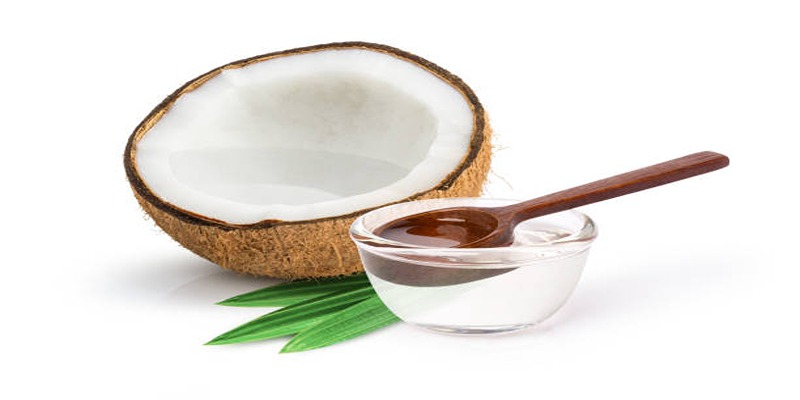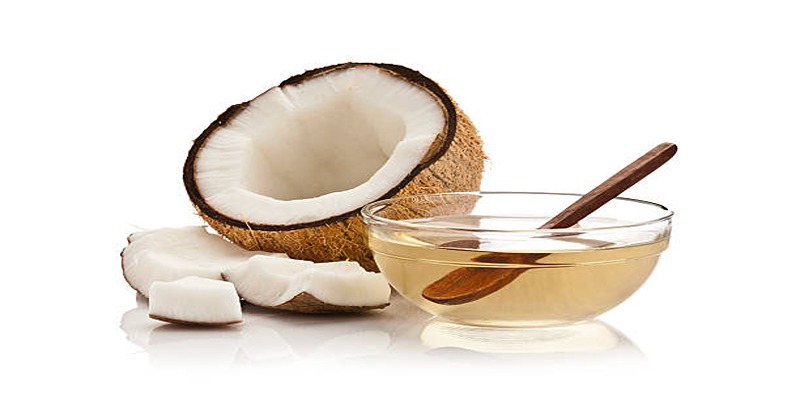Best Practices for Storing Coconut Oil
Jul 09, 2024 By Madison Evans
Coconut oil is a versatile and highly beneficial product used in cooking, skincare, and hair care routines. However, to maintain its quality and extend its shelf life, proper storage is essential. Whether you prefer virgin or refined coconut oil, understanding the best practices for storing it can prevent spoilage and ensure that it retains its nutritional properties and pleasant aroma. This guide will outline the optimal storage conditions, including ideal temperature ranges, suitable containers, and tips for avoiding contamination. By following these recommendations, you can make the most of your coconut oil and enjoy its myriad benefits for a longer period.
Ideal Temperature for Storing Coconut Oil:

Coconut oil should ideally be stored at a consistent temperature between 50F (10C) and 75F (24C). At these temperatures, the oil remains stable and is less likely to go rancid. If the temperature drops below 50F, the oil solidifies, while temperatures above 75F may cause it to melt. Though these changes in state do not affect the quality of the oil, fluctuations should be minimized to maintain consistency in its texture.
It's crucial to avoid extreme temperatures, as freezing or overheating can damage the oil's beneficial compounds. Therefore, storing coconut oil in a cool, dark place away from direct sunlight, such as a pantry or cupboard, is optimal for preserving its quality and extending its shelf life.
Choosing the Right Container:
When selecting a container for storing coconut oil, opt for glass jars or food-grade plastic containers with tight-fitting lids. Glass jars are particularly advantageous because they do not react with the oil, ensuring it remains uncontaminated. Additionally, they are impermeable to air and moisture, two factors that can accelerate spoilage.
If you prefer using plastic containers, ensure they are BPA-free and designed for food storage to avoid any harmful chemical leaching. Avoid metal containers, as they can potentially react with the oil and alter its properties. Always use a clean, dry spoon to scoop out the oil to further prevent contamination and maintain its quality. By choosing the appropriate container, you can effectively safeguard the nutritional value and aroma of your coconut oil.
Tips for Avoiding Contamination:
- Keep away from water: Water introduces moisture, which can facilitate the growth of bacteria and mold in coconut oil. Therefore, it's essential to keep the oil away from any sources of water, such as sinks or damp countertops.
- Use a clean spoon: As mentioned earlier, always use a clean spoon when scooping out coconut oil to prevent introducing bacteria or other contaminants into the jar.
- Avoid direct sunlight: Exposure to sunlight and heat can accelerate the breakdown of coconut oil and reduce its shelf life. Therefore, storing it in a dark place is crucial for maintaining its potency.
- Minimize air exposure: Air exposure can cause the oil to oxidize and turn rancid. It's best to keep the container tightly sealed when not in use and avoid leaving it open for extended periods.
- Avoid mixing with other oils: Coconut oil has a unique composition that differs from other types of cooking oils. Mixing it with different oils can alter its flavor, texture, and nutritional properties. Therefore, it's best to store coconut oil separately from other oils.
Avoiding Direct Sunlight:
Avoiding direct sunlight is paramount for maintaining the integrity of coconut oil. Ultraviolet (UV) rays from the sun can cause the oil to degrade and lose its beneficial properties, such as its antioxidants and vitamins. To protect the oil from sunlight, it is best stored in opaque or dark-colored containers, which provide an extra layer of defense against UV exposure. Additionally, placing the container in a dark, cool area like a pantry or cupboard further shields it from harmful light. These precautions help ensure that the coconut oil remains fresh, potent, and ready for use, whether in cooking or for skin and hair care.
Preventing Contamination:
Contamination can happen due to various factors, including using dirty utensils or storing the oil in unsuitable containers. As outlined above, using clean spoons and choosing appropriate storage containers are crucial steps for preventing contamination. Furthermore, it's essential to regularly check the oil for any signs of spoilage, such as a rancid odor or mold growth. If you notice any changes in color, texture, or smell, it's best to discard the oil as it may no longer be safe for consumption.
Coconut oil is an incredibly versatile and beneficial product that deserves proper care and attention when being stored. By following these best practices, you can ensure that your coconut oil remains fresh, potent, and safe for use in all your favorite recipes and beauty routines. Remember to regularly check the oil's quality and discard it if there are any signs of spoilage to avoid potential health hazards. With proper storage, you can maximize the shelf life of your coconut oil and continue to reap its many benefits.
Understanding the Shelf Life:
The shelf life of coconut oil depends on various factors, including storage conditions, quality, and processing methods. Generally, unrefined or virgin coconut oil has a longer shelf life compared to refined versions as it retains more of its original nutrients and antioxidants. Properly stored coconut oil can last up to 2 years in ideal conditions. However, it's best to use it within 6-12 months for the best flavor and benefits.
Storing Coconut Oil in the Refrigerator:
- Solidification: Coconut oil solidifies at temperatures below 76F (24C). If you live in a warm climate where room temperature is above this threshold, storing the oil in the refrigerator may be necessary to keep it in its solid form.
- Extended shelf life: Storing coconut oil in the refrigerator can further extend its shelf life by several months, making it an ideal option for those who do not use it frequently.
- Avoiding spoilage: Refrigerating coconut oil also helps prevent spoilage as cold temperatures inhibit bacterial growth. However, ensure that the container is tightly sealed to prevent air exposure and moisture.
- Softening the oil: If you need to use hardened coconut oil in a recipe, simply scoop out the desired amount and let it sit at room temperature for a few minutes until it softens. Alternatively, you can heat it in a pan or microwave on low power for a few seconds to melt it.
Tips for Using Portable Coconut Oil Containers:

- Invest in a leak-proof container: When traveling with coconut oil, it's crucial to use a leak-proof container to avoid any spills or messes. Look for containers specifically designed for oils or liquids with tight-sealing lids.
- Choose the right size: Consider the length of your trip and how much coconut oil you will need before choosing a portable container. It's best to have extra space in the container rather than not enough.
- Opt for dark-colored containers: As mentioned earlier, dark-colored containers provide an extra layer of protection against UV exposure, making them ideal for travel.
- Consider temperature changes: If traveling to a warm climate, make sure to keep the container in a cool place or even refrigerate it if possible. Sudden changes in temperature can cause coconut oil to melt and potentially leak from the container.
- Use separate containers for different types of oils: To avoid contamination and preserve the unique qualities of coconut oil, consider using separate portable containers for different types of oils when traveling.
Conclusion:
Proper storage is crucial for maintaining the quality and potency of coconut oil. By following these tips, you can ensure that your coconut oil remains fresh, safe, and ready for use whenever you need it. Remember to check the oil regularly for any signs of spoilage and discard it if necessary. With proper storage, you can maximize the shelf life of your coconut oil and continue to enjoy its many benefits in all aspects of your life. So, keep these tips in mind and show some love to your coconut oil by giving it a proper storage space!

Folate Vs. Folic Acid - Why The Difference Matters

Shrimp and Wellness: Debunking the Myths About This Popular Seafood

Best Kidney Disease Treatments

Top 8 Salicylic Acid Face Washes for Dry Skin

Expecting Radiance: Safe Skincare Habits During Pregnancy

Sugar Smart: 8 Strategies Dietitians Use to Moderate Daily Sugar Intake

Mastering Meditation: A Comprehensive Scientific Guide for Stress Reduction and More


